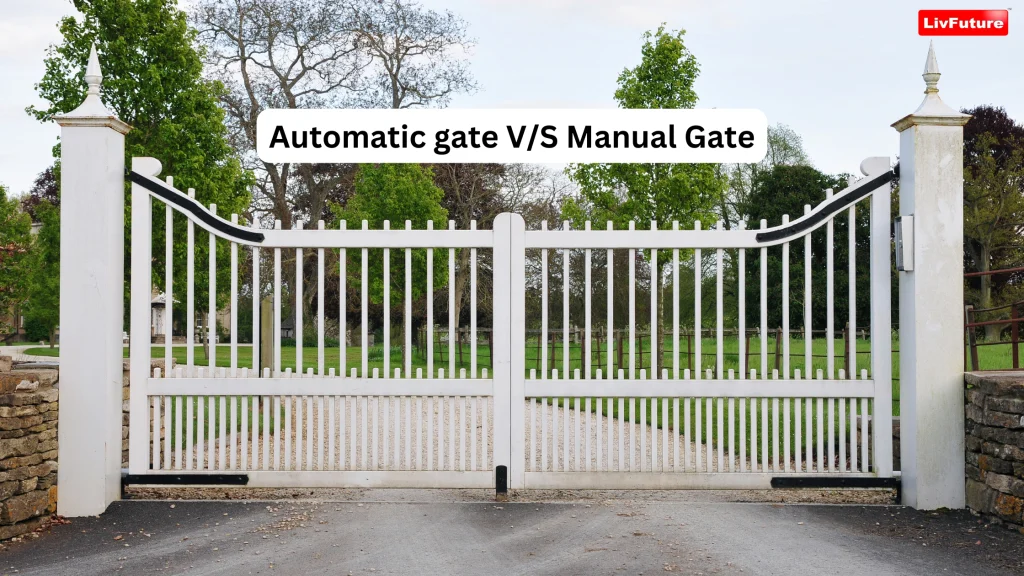Gates are essential for security and privacy in both residential and commercial properties. However, when it comes to choosing between a manual gate and an automatic gate, many factors need to be considered. Each option comes with its own set of advantages and disadvantages, so deciding between the two is an important one. In this blog, we’ll explore the definitions, advantages, and disadvantages of manual and automatic gates, helping you determine which is the best fit for your property.
what is a manual gate?
Manual gate, also known as a traditional gate. It requires manual operation for opening and closing. This type of gate is typically operated by hand, either by pushing it open or pulling it closed.
Advantages of Manual Gates:
Affordability: Manual gates are generally more affordable to install compared to automatic gates. They require less equipment and infrastructure, making them a cost-effective option for property owners on a budget.
Simplicity: Manual gates are simple in design and operation, making them easy to understand and maintain. There are fewer components involved, reducing the likelihood of technical malfunctions.
Durability: Manual gates tend to be more durable than automatic gates since they have fewer moving parts that can wear out over time. With proper maintenance, a well-built manual gate can last for many years.
Disadvantages of Manual Gates:
Limited Convenience: Manual gates require physical effort to open and close, which can be inconvenient, especially for larger or heavier gates. This manual operation may also be challenging for elderly or disabled individuals.
Security Concerns: Manual gates may be less secure than automatic gates since they rely on physical locks or latches that can be tampered with or forced open. This can pose a security risk for properties requiring higher levels of protection.
Limited Features: Manual gates lack the advanced features and functionality of automatic gates, such as remote operation, access control, and integration with other security systems.
what is an Automatic gate?
An automatic gate, also known as an electric gate or remote control gate, operates automatically with the use of an electric motor or hydraulic system. These gates can be opened and closed remotely, usually via a handheld remote control or a mobile app.
Advantages of Automatic Gates:
Convenience: Automatic gates offer unparalleled convenience, allowing users to open and close them remotely with the push of a button or the tap of a smartphone screen or remote. This eliminates the need for manual effort and saves time for property owners and visitors.
Enhanced Security: Automatic gates provide enhanced security features, such as access control systems, motion sensors, and remote monitoring capabilities. These features help to stop unauthorized entry and improve overall property security.
Customization Options: Automatic gates offer a diverse range of customization options, enabling property owners to tailor their gate system according to their specific needs and preferences. This includes choosing from various designs, materials, and access control methods.
Disadvantages of Automatic Gates:
Higher Cost: Automatic gates are typically more expensive to install and maintain compared to manual gates. They require additional equipment, such as electric motors, sensors, and control systems, which can drive up the overall cost of the project.
Complexity: Automatic gates are more complex in design and operation than manual gates, requiring professional installation and regular maintenance to ensure optimal performance. Technical issues may arise that require troubleshooting by qualified technicians.
Dependency on Power Supply: Automatic gates rely on a continuous power supply to operate, which means they may become inoperable during power outages or electrical failures. Property owners should have backup power options in place to mitigate this risk.
Conclusion:
Both manual and automatic gates have their own set of advantages and disadvantages, and the best option for your property will depend on your specific needs, budget, and preferences. Manual gates offer simplicity and affordability but lack the convenience and security features of automatic gates. On the other hand, automatic gates provide unmatched convenience and security but come with a higher upfront cost and require regular maintenance. By carefully weighing the pros and cons of each option, you can make an informed decision that meets your property’s requirements and enhances its overall functionality and security.
| Feature | Automatic Gates | Manual Gates |
| Operation | Operated automatically | Operated manually |
| Convenience | Highly convenient, requiring minimal effort | Less convenient, requiring physical effort |
| Security | Enhanced security features such as remote access control | Relies on manual locking mechanisms |
| Cost | Generally more expensive to install and maintain | More affordable to install and maintain |
| Maintenance | Requires regular maintenance to ensure smooth operation | Low maintenance requirements |
| Customization | Offers a wide range of customization options | Provides flexibility in design and materials |
| Dependency on Power | Relies on electricity, vulnerable to power outages | Not dependent on electricity, reliable during power outages |
| Reliability | Subject to potential mechanical issues | Generally reliable without dependence on motors |
Considering security and time-saving aspects, automated gates are the best choice for your property. LivFuture Automation offers a wide range of automated gates, boom barriers, and more at affordable prices.


Pingback: Steel Gate Designs for a Modern and Minimalist Look
Pingback: How to Secure Your Commercial Property with Smart Gates